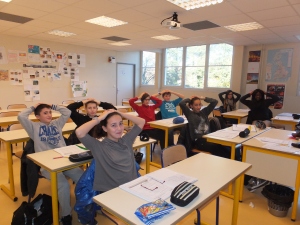I have been living and working in France for almost three months, and it’s time I started telling the truth.
1, Sorry, France, but I have been teaching 300+ students a week under the guise of a teaching professional. I am no such thing. I am a third year student on her year abroad. The closest thing I have to a PGCE qualification is a first in a TEFL module, a module (I might add) for which I slept through most of the lectures. But, really, you should have guessed that. I’m twenty years old. Twenty. What kind of teacher is twenty years old? An unqualified one. Add that to your joke book.
2, Related to the aforementioned confession, until I jumped on a (broken) plane to France, I had yet to stand on my own in front of a group of chatty 14 year olds and deliver a lesson from scratch. My outrageously naive younger self truly believed that when the French government employs me as a teaching assistant, a teaching assistant is what I would be.
3, When I walked into the 3e class on that cold October Wednesday morning in the middle of my ‘observation period’, I did, funnily enough, believe that I would be observing the class. So yes, actually, when the teacher handed me her class register and told me to choose fifteen students to take to my new classroom (salle 106), I was a little surprised.
Imagine, for example, walking up to your bus stop and waiting for a bus that you take every morning,only for the bus driver to step out of his little cabin, wink at you, and say, “right, love, your go”.
4, When I asked what the teacher wanted me to do with said class, I wasn’t joking. I actually needed ideas. She turned to me and said, ‘teach them something about personalities’, and when I replied with ‘perfect, see you soon’, I didn’t mean that. At all. Nothing about the situation was perfect. It wasn’t even remotely fine. Or ca va. I faced (and overcame) some of my worst fears at nine am on a Wednesday morning, and that teacher will never know.
5, While we’re on the subject, I’d like to add that my second ever lesson in front of a class all on my own was observed. I was observed. By two French students who actually were studying to become teachers. The most embarrassing part is how I found out. To stall the lesson somewhat, I began by asking each pupil to introduce themselves. I was interrupted by one of the girls who asked if her and her partner really had to introduce themselves, to which I replied ‘why not?’. Here’s why not: They were both at least seven years older than the rest of the class and only there to take notes. My bad.
6, Fortunately, my qualification deficiency may actually give me somewhat of an advantage. You see, I’ve never been given rules to follow, even if I really could do with some right now. So I tend to make my own up, and this has led to spectacular results. A combination of the fact that I was as old as my youngest students less than a decade ago and that I’m from England (and therefore mildly mysterious in their books), means that I get away with a lot.
And when I say a lot, I mean it.
Now, I don’t follow conventional methods when I’m teaching a class and the noise level creeps higher than I’d like. Partly because I would imagine that shouting at them in poor French/Franglais is likely to do more harm than good, but mainly because I know for a fact that nine times out of ten,screaming at a class for twenty minutes won’t get you anywhere. Fancy that, France.
All a teacher tantrum does is offer up the chance for the self-confessed comedian/comedienne of the class to mimic your fall from grace with such accuracy that the rest of the group will never listen to you again. And if you have to scream and shout on a regular basis, then you’ll lose your voice before you gain their respect.
So no, thank you, but I have my own methods.
1. If you like me and you know it, put your hands up
Age: This technique can be used on any age in collège (high shool)
Method: Wait until the noise level creeps up into the realms of playground parler, then stop talking completely. The kids who had been slyly observing your reaction will slowly respond to this and shut up. If you’re lucky, you might have a teacher’s pet or two willing to do the job for you who will then start ‘shushing’ the class. You wait until the class is silent, and then look around the room, ensuring eye contact is made with the majority. Especially the kid at the back of the class who fully believes he is above learning English. I mean, it’s not like there are over 200 million anglophones in the world or anything. Anyway, I digress.
To ensure some level of language acquisition has been obtained by the end of the year, you need to first judge whether they’re on your side or not. Once silence has returned, put your hand in the air and ask the rest of the class if they like you and want you to stay for the whole year. Naturally (as you’ve only been there a week at this point, and nobody knows just how mean you can be) everyone’s hands will shoot up. Wait until this happens, and then continue speaking in as calm a voice as possible, saying that the teacher (that’s you) can choose whichever class he/she likes to teach, so if they’re naughty, you simply won’t return. Silence will fall.
NB: You do have to keep your promise on this one.
2. Zip it
Age: This works wonders for the 4e (year 9)
 Method: Interrupt the lesson with a quick vocab lesson and teach them the meaning of ‘zip it’. They will understand the concept and soon realise that you’ve just taught them an easy, mildly-but-not-really offensive word they can use on their friends and family. Afterwards, instead of telling them to be quiet, tell the class to zip it. The pupils will find this funny more than anything, and so they’ll be more likely to listen.
Method: Interrupt the lesson with a quick vocab lesson and teach them the meaning of ‘zip it’. They will understand the concept and soon realise that you’ve just taught them an easy, mildly-but-not-really offensive word they can use on their friends and family. Afterwards, instead of telling them to be quiet, tell the class to zip it. The pupils will find this funny more than anything, and so they’ll be more likely to listen.
3. English whispers
Age: This often works best with the older pupils, age 13+
Method: Quite a simple idea. Wait until the class noise is louder than the sound you’re making, and then without warning, start whispering. Normal pace, normal language style, volume down. It shouldn’t take too long for the pupils to start worrying that they can’t actually hear what you’re saying. Which is, I would imagine, even more confusing when you’re talking to them in a different language. Once the class is silent, continue whispering, and maybe say something to the effect of: “Oh, you can’t hear me? Well, if you were paying attention to the class, you would probably understand what is going on right now”. Chances are, they still won’t understand you, but it works all the better.
4. Put your hands on your head
Age: I would stick to collège (high school) age. Any younger and it becomes a fun game, any older and they might just hate you
Method: This can either be used as a last resort or something to keep those kids at the back of the class in check. The concept is simple, but I’ll start with an anecdote: Two self-confessed ‘lads’ at the back of the class; the kind of boys who will then leave the classroom to join the rest of Blazin’ Squad and blast out rap songs from their HTCs. I never have a problem with these two, but they seem to have a joint attention spam shorter than a whiteboard marker. One day, as these two charmers were throwing pieces of paper at their fellow peers, I decided that enough was enough. Here is what followed:
Me: Right. Pierre, Mathieu, hands on your head. P&M: … Me: Hands *waves hands* on your head *mimics intended action* P&M are extremely confused by this point, yet continue to do what has been asked of them. Me: No, Pierre, that’s your neck. Your head is up here. Now let’s try that with two hands. A: Mais je suis faitigué!
By this point, the other students are laughing out loud at the absurdity of this newfangled English punishment. I then address the entire class, often saying something along the lines of: “OK, you have two choices. You can either keep your hands on your head and bavarder all you like or you can put your hands on the table and be quiet”.
Now, this method isn’t limited to the two lads at the back. If the whole class is feeling particularly disruptive, then it’s just as easy and effective to have them all sit with their hands on their head.
NB: The reason this works so well is because the hilarity of looking around at your classmates sitting with their hands on their head like they were six-years-old tends to stun the chatterboxes into a confused silence. Prolong this punishment for as long as you feel necessary, as it does no harm to your reputation as a teacher and probably gives them something to talk about in the playground.
Word of advice: Don’t try this at home (Angleterre).
It probably won’t work with English kids.




Hello ☺ I loved reading your blog. I’ve just had my interview for a PGCE at University and am awaiting my response. I hope you don’t mind but I’ve followed your blog as I feel it will be really helpful when I begin the degree, if I get in. I’d love it if you could check out my blog, I think we may cross paths quite a bit in our posts ☺ Thank you http://mylifemybubble.wordpress.com/2013/12/29/the-waiting-game/